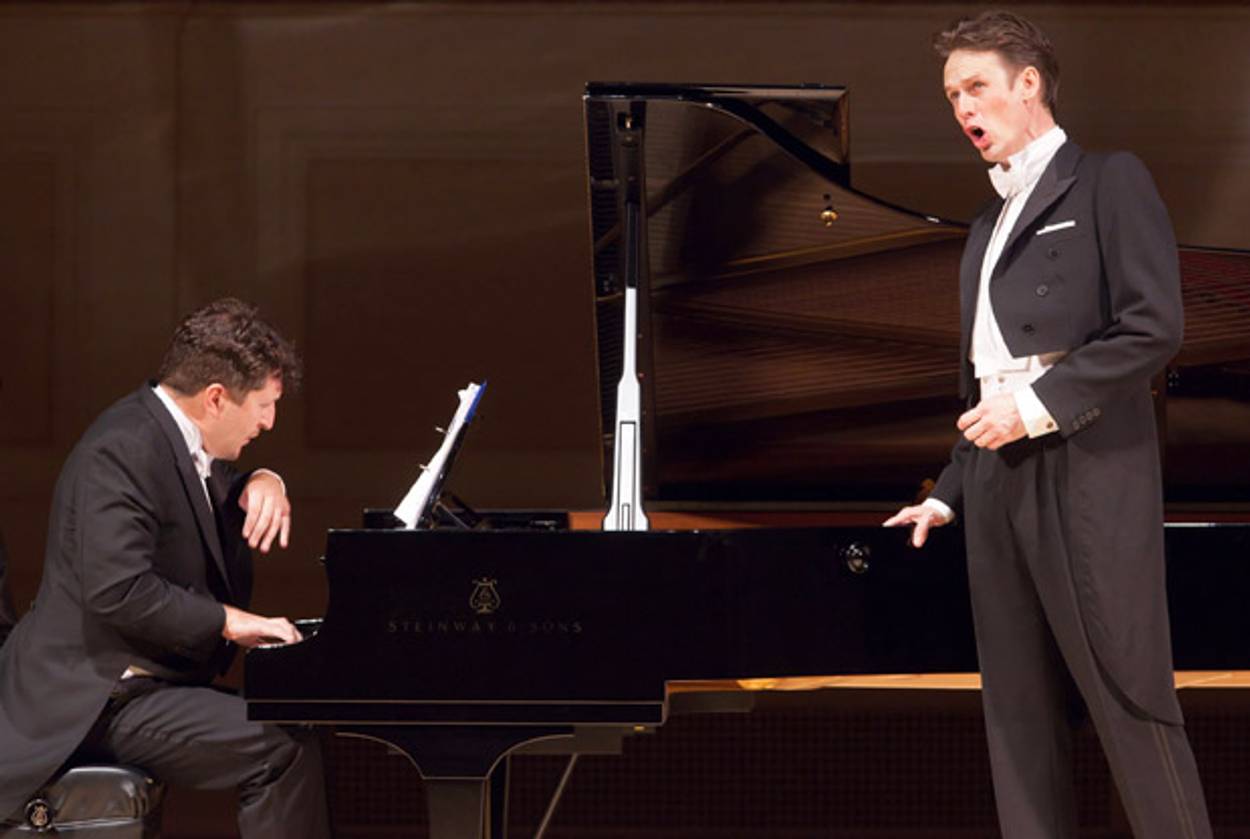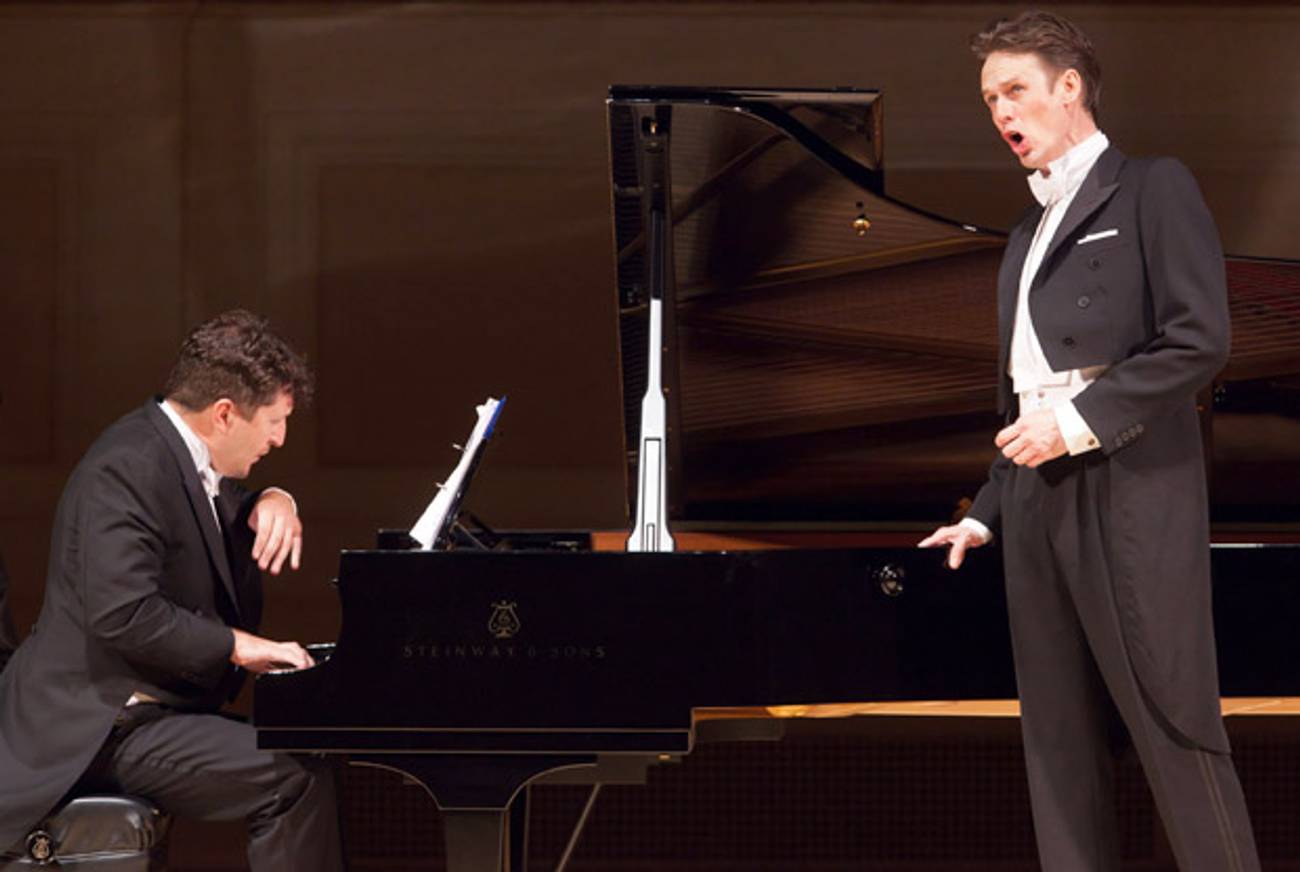Poem Love
In a recent performance of Schubert’s and Schumann’s settings of Heinrich Heine’s poetry, tenor Ian Bostridge and pianist Thomas Adès excelled




Musical settings of the poetry of Heinrich Heine were the unifying theme at Ian Bostridge’s Carnegie Hall recital Monday. Bostridge, a tenor, is one of the world’s best-loved interpreters of art song, and his New York appearance did not disappoint. Heine’s concise, ironic love poems set by Franz Schubert and Robert Schumann often hinge on a mood-reversal in the last line, like the punch line of a joke. Bostridge declaims as effectively as he sings, and he conveys Heine’s bitter humor with nuanced comic timing and inflection. The punch lines are all the more effective for Bostridge’s understatement.
His partner at the piano, the composer Thomas Adès, provided more than accompaniment. Schumann’s selection of 16 poems from Heine’s “Lyric Intermezzo,” the Dichterliebe (Poet’s Love) Op. 48, gives the piano an unusually independent voice, including several extended postludes. Adès exercises a preternatural degree of control at the keyboard—his pianissimo trills sound like a muffled electric bell—and he switched seamlessly between restrained backing for Bostridge and boisterous renderings of the piano music.
Heine converted to Christianity in his youth but returned to Judaism on his death bed, where he wrote a handful of last, deeply religious poems. He remained conflicted until his death between the blandishments of secular culture and Jewish faith. Schubert and Schumann set his early love poetry, with its aching sense of loss and anti-Romantic self-awareness. Not until much later was Heine identified with the 12th-century Hebrew poet Yehuda Halevi, whose love was “the very picture of destruction, and her name was Jerusalem.” Still, Heine’s early poems belong to the cultural treasure-chest of the Jewish people. The attraction and repulsion of earthly love in Heine’s verse betray the sense of the sacred that emerged in his deathbed poems. And the settings of great composers offer the easiest point of access now that Jews have parted company with the German language.
Bostridge’s voice is pretty rather than powerful, strongest in the head voice, and sometimes strained in lower registers. He has a disconcerting habit of starting vibrato a moment after starting a note. Many operatic tenors—one thinks of the late Fritz Wunderlich—brought a more beautiful sound to this repertoire. All his vocal sins are forgiven, though, for his service to poet and composer.
Bostridge and Adès were at their best in songs like the Dichterliebe’s No. 14, in which the poet recounts a recurring dream about his lost love: She gives him a cypress branch and whispers a soft word to him, and then, “I wake up, the branch is gone, and I’ve forgotten the word.” To convey the somnambulant character of the narrative, Schumann keeps the meter eerily off-beat, so that the last line tumbles out too quickly, enhancing Heine’s punch line.
Not all of the Dichterliebe came off so well. No. 9 is a ghastly waltz, in which the poet lurks outside his beloved’s wedding party, listening to the dance music. “There’s a flute, a violin, and trumpets … and in between, the lovely little angels sob and groan,” the poet sneers. Inexplicably, Bostridge chose a tempo so fast that even the masterful Adès could not find many of the bass notes. (For Vladimir Horowitz’s version, see here at minute 1:25.)
And in the penultimate song, which tells of a fairy-tale land, Adès ignored Schumann’s repeated emphasis on the wrong beats, which so effectively convey the weirdness of the vision. To Heine’s complaint that “when the morning sun arrives, it all dissolves into foam,” Schumann evokes the popping of a bubble; and the popping bubble at the end of the song sets up the grand appoggiatura that announces the final number, a funeral march for the poet’s illusions.
Bostridge’s choice of an exceptionally fast tempo in the final song also was puzzling. The verse is a dead-march that evokes giants carrying an enormous coffin to the sea, where the poet will bury his love and pain—not a quick-step. The overlap between the final measures of the preceding song and the opening of the last number also indicates a moderate pace. Bostridge had chosen a better tempo in an earlier performance.
These are small complaints, though, about a performance that for the most part displayed intelligence and attention to detail. The second half of the program included the seven Heine songs Schubert composed in the last year of his life, from the posthumously published Schwanengesang, or “Swan Song,” collection. Here Bostridge was entirely at home and convincing in all respects.
The evening opened with a curious self-indulgence: Bostridge performed a song by the English Renaissance composer John Dowland, and Adès followed with a solo composition—as the program notes explained, they were “exploding” Dowland’s music. It is the sort of work, to paraphrase Rossini, that one can’t appreciate at first hearing but isn’t likely to listen to twice.
David P. Goldman, Tablet Magazine’s classical music critic, is the Spengler columnist for Asia Times Online, Senior Fellow at the London Center for Policy Studies, and the author of How Civilizations Die (and Why Islam Is Dying, Too).
David P. Goldman, Tablet Magazine’s classical music critic, is the Spengler columnist for Asia Times Online, Washington Fellow of the Claremont Institute, and the author of How Civilizations Die (and Why Islam Is Dying, Too) and the new book You Will Be Assimilated: China’s Plan to Sino-Form the World.